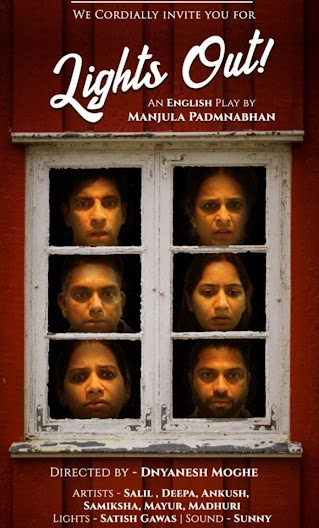Lights Out!: A Review
Lights Out! by Manjula Padmanabhan finds new expression through Dnyanesh Moghe’s direction and his actors. The play, which was performed on the 10th of August 2019 at the Multipurpose Hall, Central Library, Panjim, was inspired by a true incident that took place in 1982 in Santa Cruz, Bombay, albeit with fictional characters recreating it.
The play commences with an unnerving, unearthly cry, evoking a sense of trepidation and suspense. We are told that the protagonist Leela has been hearing these distressing cries for some time and been pressuring her husband Bhaskar to call the police. Although she is not certain of the reason for the cries, innate intuition does not allow her to dismiss them as anything but the result of a crime. Bhaskar, on the other hand, finds every excuse in the book to avoid calling the police. He deems it fit, however, to call his friend Mohan to watch the ‘spectacle’ that we learn he has been witness to.
What follows is an inane justification of the clearly untoward acts that are being committed as Mohan adjudges the occurrence a religious ritual. Bhaskar is in agreement with Mohan while Leela vehemently argues the pronouncement. She oscillates between the desire to believe the summation by Mohan and the veracity of her own instincts.
Naina, another friend, appears as the voice of reason in this dual display of cowardice and callousness. She calls the act for what it is – rape! The men try their best to dissuade her to little avail, even labelling the incident an exorcism. They reason that their reluctance to go to the aid of the woman is the idea that she may be a prostitute and therefore deserving of such treatment.
When Naina’s husband Suren arrives, he bellows that they should go to the rescue of the woman immediately with the intention of killing the perpetrators. He mocks the other two men for their effeminacy. Nevertheless, by the time they decide what exactly should be done, the culprits have departed from the crime scene.
The play addresses two main issues. One is the unwillingness of people to rescue someone from an offence being committed despite the blatant nature of the act, as in this case. The crimes take place in a respectable neighbourhood and one would assume that the people living in the locality would come to the rescue of the women being raped, but there seems to be ‘bystander apathy’ (a term coined by the US psychologists John Darley and Bibb Latané). This apathy was first noted by the media in the Kitty Genovese case in 1964, where 38 individuals stood by and did nothing as Kitty was sexually assaulted and murdered. The case, although doubtful in its occurrence, serves as a reminder of how the normal people can be cruel in their reluctance to remove themselves from their comfortable lives and take responsibility for the safety of someone else.
The second, and extremely significant, point the play makes is the attitude of Indian men towards women. In this case, education does not make a dent in the approach of both Bhaskar and Mohan. Bhaskar has little thought for the sentiments of his wife and the crime is almost a form of entertainment to him and Mohan. Their reasons for not helping the victims range from the women being of a lower class to being prostitutes who are asking for ‘it’. There is a class prejudice that is interwoven with the subjugation of women. The mostly unseen Frieda typifies the lower class woman without a voice.
Bhaskar says, ‘After all, what is a woman but someone decent enough to be raped,’ stating in a nutshell the precarious position of women in Indian society. Suren, for all his ardour to save the victim, has little respect for what his wife has to say and even jostles her in his bravado. The title Lights Out! perfectly encapsulates the mind-set of the purportedly respectable people who made no effort to put an end to the crimes perpetrated against helpless women. The play serves as a stimulus to awaken the conscience and cement the idea that all women are worthy of respect and sanctuary no matter their socio-economic status.
Dnyanesh Moghe’s direction is noteworthy, and every actor (Deepa Moghe as Leela, Salil Naik as Bhaskar, Ankush Pednekar as Mohan, Samksha Desai as Naina, Mayur Mayenkar as Suren, and Maduri Shetkar as Frieda) portrayed his or her character’s role admirably. The lighting (Satish Gawas) and sound effects (Sunny Rawool) in tandem with the suspenseful dialogue superbly raised goose bumps and kept the audience in the grip of anticipation.
(Originally published in August 2018)




Comments
Post a Comment